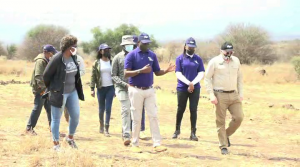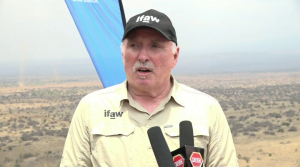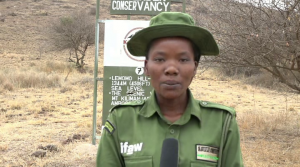A group of young Maasai women in Amboseli, Kajiado North, are breaking cultural barriers and helping their community to conserve wild animals in their neighborhood. The 16 women, aged between 18 and 24 form an all-girl community ranger unit that has been helping reduce poaching and retaliatory killings of wild animals that attack livestock along the wildlife migratory corridors. This has, as a result, seen a reduction in human-wildlife conflict in the neighborhood surrounding the Amboseli National Park. The unit, code named Team Lioness, patrols the almost 400,000 acres of community land surrounding the park, where wildlife spends 70 per cent of their time.
The land is part of the Olgulului-Ololarashi Group Ranch (OOGR), owned by close to 6,000 land owners. The unit, part of the now 85-member strong Olgulului Community Wildlife Rangers, is being supported by the International Fund for Animal Welfare, which recruits, trains and pays the rangers from the community. They Team Lioness has been walking on foot for between 20km and 40km a day during their patrols but this will soon end as Ifaw has now provided an additional patrol vehicle for them. Ifaw president, Azzedine Downes said the involvement of women from the community is strategic. 
He said women were at first left out of conservation efforts yet they are the ones most at risk of attacks by wild animals because they are the ones tasked with fetching firewood and water from the wildlife migratory corridors. He said it was a mistake to not involve 50 per cent of the population, which he says women make up, in conservation efforts“When I first came to Kenya and we established Team Lioness in 2018, I asked the women, what was the biggest change beyond just the daily work, and one of the things they told me was they felt they were being listened to for the first time,” said Downes.
Their main duty is to talk to pastoralists, who cover a lot of ground with their livestock and encounter wild animals along the way. They monitor the wild animals’ movement patterns and record their GPS coordinates. This helps them know where the wild animals like to frequent and warn the pastoralists to avoid areas where they would likely encounter wild animals. Members of Team Lioness say women are considered weak in their Maasai community and their decision to join the rangers was at first met with doubt, scorn and sneer. However, today, they are widely embraced. OOGR treasurer and a community elder Elijah Keen said the involvement of Maasai women as wildlife rangers means the world is changing and equity is being achieved more and more.
“The Maasai community does not recognize the female species, if I may put it that way. By introducing ladies into the security team is an indication that even women can do something and can even do better,” said Keen. “It was even a problem to convince them to come forth and get employed. But this one has become a game changer in the society because there is this notion that now possible to have a women do something that is thought to be a man thing,” said Keen. OCWR director of operations Patrick Papatiti said the decision to take source of information in conservation efforts through a programme called ‘Ten Bombers’. 
Papatiti said Team Lioness was first formed in 2018 with eight women representing the eight clans in the Olgulului community. According to Papatiti, the eight were deployed to the Risa base, where there was a lot of predation and human-wildlife conflict. “We monitored them and the base for two years and the results were positive. We have never lost a lion or any other animal in that area since they were deployed,” said Papatiti. The OCWR director of operations believes the success of the unit was largely based on the soft approach they took. The all-girl ranger unit used their convincing power to talk Maasai warriors out of retaliation whenever wild animals attacked their livestock.
The success of the eight women rangers motivated them to take more on board, prompting another recruitment drive that saw eight more women join the unit. The eight more women have also undergone training and would be fully funded for the next two years by the German foundation “Margarete-Brewer-Stunning” (MBS). “The rapid growth of Team Lioness is a testament to the need for gender equity in conservation and the community’s acceptance and willingness to support this initiative,” said Downes. IFAW supports the now 85 Olgulului Community Wildlife Rangers (OCWR) by providing logistical support such as paying their salaries and providing them with all necessary supplies including food rations, medical insurance, equipment including uniforms, vehicles, digital radios, maintenance and running of the vehicles, and data collection tools.
Sharon Alnkinyi 21 years old, says they were the firm females from her community to be recruited as rangers, but her community though she would not pacifier and endure tedious work in the jungle and also how to encounter wild animals in the park. Sharon says their work is to gather intelligence on poaching through camouflage by intermingling with women in their daily chores. Purity Lakara aged 24 and a mother of a three year old child, is another proud ranger. ” We operate under strict instructions from our superiors. A day for us entails early morning runs around our several base camps located within the conservancies before we retreat and plan for the day’s patrols that are either on foot or by vehicles at our disposal,” she said. 

